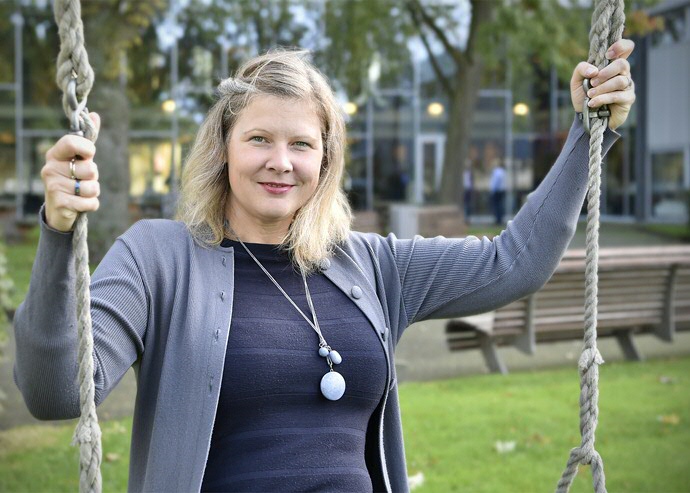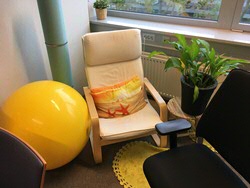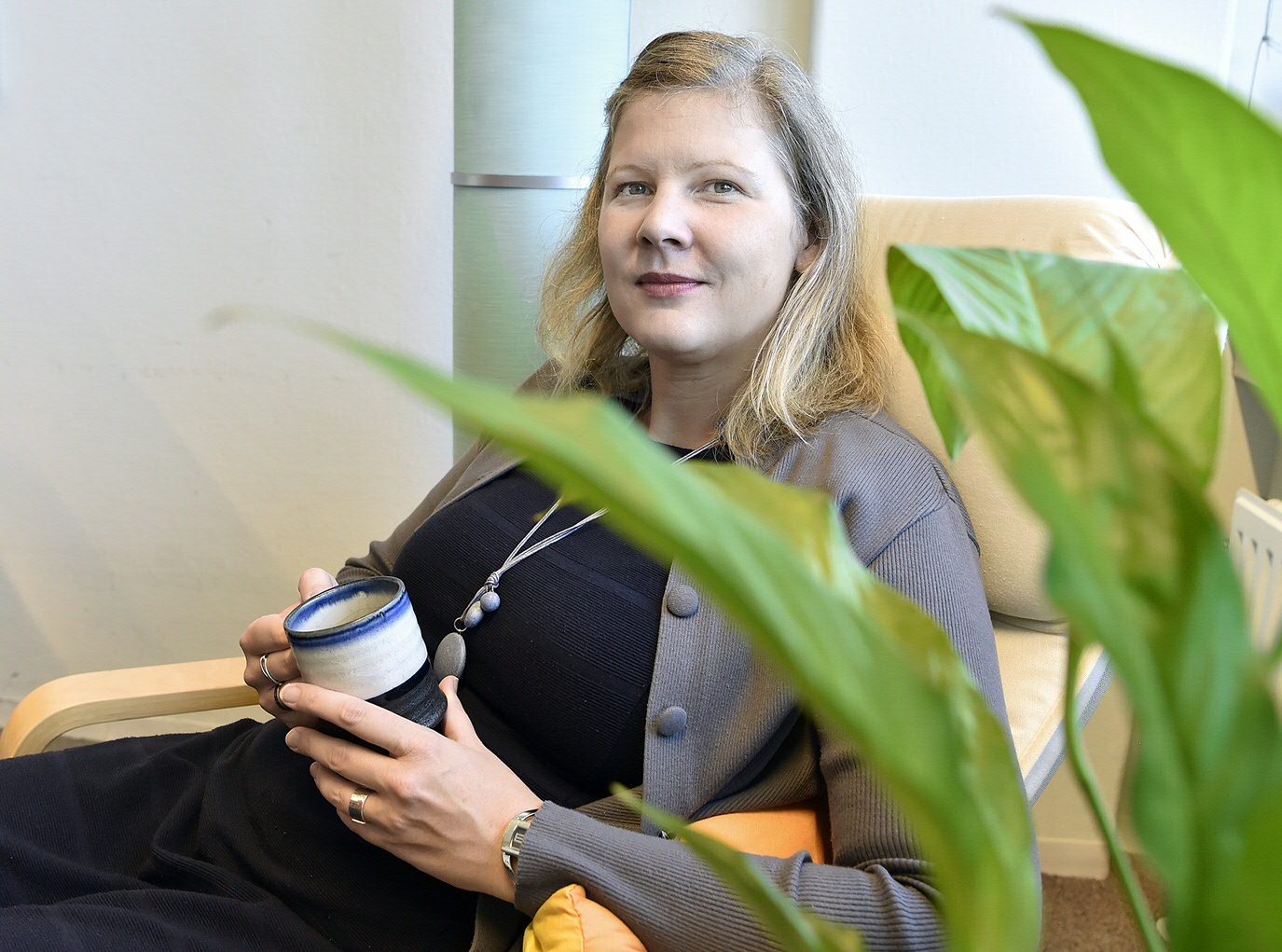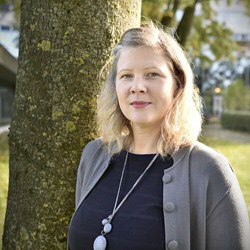No arguing: it’s time to relax

Thanks to the smartphone, these days we keep our work on the kitchen table or bedside table. The boundary between work and private life is steadily fading. This is a cause for concern, says Jessica de Bloom, who thinks that we should be using our leisure time to recover from the pressures of work. But the occupational health psychologist at the University of Groningen also acknowledges that this is easier said than done. Even in this remote, primitive Finnish log cabin, she cannot resist the odd furtive glance at her mailbox.
Text: Riepko Buikema, Communication Office; photos: Elmer Spaargaren
A fitness ball, a comfy chair for reading, two round yellow rugs and a huge pot plant on a round side-table. A designer lamp in the corner, a framed photo of the stunning Näsijärvi lake close to the Finnish city of Tampere. In line with her research, Jessica de Bloom’s office is a mini-oasis for anyone in search of tranquillity. ‘The setting is inspired by my research. Recovering from the stress of work is something that I am personally interested in. That corner over there is where I relax or read. It’s where I sit back and put my feet up.’

Digital leash
The Netherlands leads the way in the practice of ‘new working’. It makes us more flexible and more adept at combining work with family life, for example. But according to De Bloom, we should be more aware of the negative aspects. Modern means of communication can also feel like a digital leash. ‘We don’t always have anywhere decent to work at home and there’s no division between work and private life. We are permanently available. Wherever we are, our work is there too, in our pocket. Even at weekends and on holiday. Our minds are constantly aware of work. I’d go as far as to say that we don’t really have leisure time anymore.’
The right to be unavailable
Time and time again, academic research has shown how important it is to distance yourself mentally from your work in order to avoid a burnout. De Bloom, occupational health psychologist and Rosalind Franklin Fellow at the University of Groningen, sees the Collective Labour Agreement recently agreed upon in the care for people with disabilities as an excellent initiative. The agreement gives staff the right to be unavailable on their days off. It’s a first for the Netherlands. ‘This is progress. People need to be protected. Employees must have the option of being unavailable and ignoring text messages and emails if they want to.’

No such thing as leisure time
The increasing influence that work is having on our leisure time is not the only thing that is interfering with relaxation. Recovering from the pressures of work can also be hampered by the stress that we inflict on ourselves at home. ‘A lot of people don’t feel particularly free in their time off’, claims De Bloom. ‘We want to be active, eat healthy and look good, take care of our children and our parents, have a busy social life and an Instagram account to show everyone how well we’re doing.’ If we want to be sustainably employable and happy, it’s vital that we take a long, hard look at how we spend our leisure time, says De Bloom. And now there’s an app that might be able to help us.
‘Off-job crafting’
It’s called Everydaily and it was developed by De Bloom and her colleagues. It makes users aware of their psychological needs and teaches them ways of fulfilling them. In the same way that employees with enough autonomy can shape their own jobs (job crafting), we can also think about which leisure-time activities help us to recover from the stress of work: off-job crafting.
Digital diary
De Bloom: ‘Every day, the app suggests three activities that will help you to fulfil your mental needs. For example: visit your favourite outdoor spot, upload a photo and say how this makes you feel.’ The result is a digital diary with scores for activities such as mentally distancing yourself, relaxing, doing something meaningful or connecting with others. ‘It works rather like a Tamagotchi. The app shows you how your well-being is developing. If you feel the need to distance yourself from your work, for example, the app will show you which of your past activities helped you to do just that.’
Employees from a number of Finnish companies are using the app as part of De Bloom’s research. They attend workshops intended to provide support for the required change in their behaviour. ‘Everything revolves around the key question: how can I change my leisure time so that I benefit more from it? The idea is that off-job crafting can help people to stay healthy and happy, and achieve a higher quality of life.’

Downside
But surely an app that awards points for leisure-time activities is a contradiction in terms? ‘I have to admit that the optimization factor is certainly a downside. It means that you have to be consciously aware of relaxing. Sitting down at home and doing nothing becomes practically impossible. I can identify with that feeling of lazing around on the sofa and a voice in my head saying: shouldn’t you be studying Finnish or going for a run?’
Back to basics
De Bloom isn’t afraid to admit that even as an expert in the field of work stress and recovery, it’s not always easy to find time to relax. This is despite the discovery that she made during her time in Finland, where she still goes for a week every month to conduct her Making leisure work research project. ‘Nearly every family has a Mökki. It’s a very simple, often home-made wooden hut, on a lake or in a forest. There’s no running water and usually no electricity either. I didn’t get it at first. Why would you want to go back in time and spend time in such primitive conditions? But I’ve since been converted. It’s so different from anything else. Everything you do takes an eternity: preparing your food, lighting a fire so that you can have a wash. You really get back to basics. You escape the stress, the preoccupation with work, the need to get everything done as quickly as possible and the urge for permanent contact with the world.’
Sin
But be honest: did you leave your smartphone in Tampere? ‘Mmmm, no. I really enjoy my job. I’m not very good at switching off from work or setting boundaries’, she says with a guilty laugh. ‘I do take my telephone with me to the log cabin. But I try not to look at it too often and I don’t use it much. Being here in the midst of all this natural beauty just banishes all thought of work and stress from my mind. It would be a sin to sit there looking at your phone when you could be staring at this lake instead.’
More information
- Contact: Jessica de Bloom
- Making leisure work: Leisure crafting as active recovery from stressful work. Funded by the Academy of Finland
More news
-
10 February 2026
‘Regeneration starts where courage meets imagination’
-
09 December 2025
Are robots the solution?
